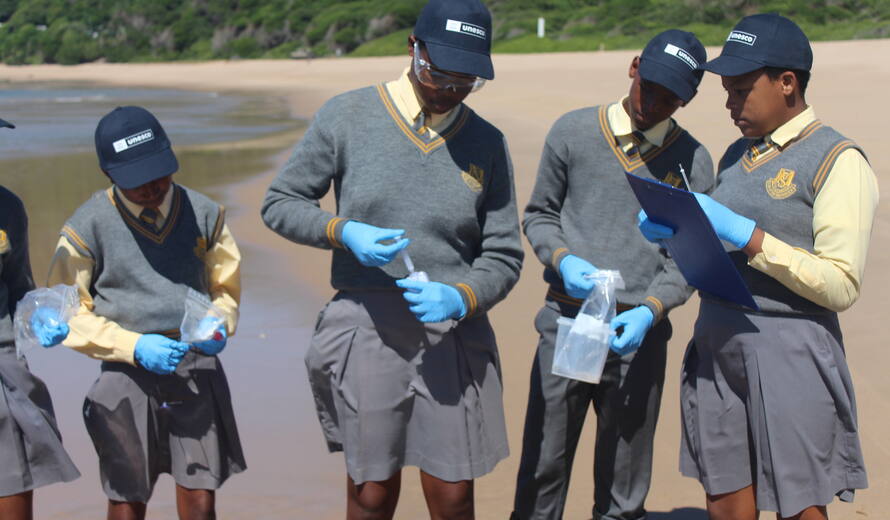School children from rural areas in South Africa join eDNA sampling of iSimangaliso Wetland Park
High school children from rural villages travelled to iSimangaliso Wetland Park to sample South Africa’s unique World Heritage-listed marine area as part of the global eDNA expeditions UNESCO is currently piloting across 25 marine World Heritage sites to better understand ocean biodiversity and the effects of climate change.
In the early morning of 19 April 2023, children from three high schools from the rural village of Mtubatuba, Mbazwana and Kosi Bay in South Africa travelled with local scientists and teachers to iSimangaliso Wetland Park World Heritage area to become citizen scientists for the day.
Accompanied on their journey by hippos, Nile crocodiles, rockskippers and yellow-billed kites, the children collected water samples at 5 different locations across iSimangaliso Wetland Park World Heritage area and filtered genetic material of species with the help of eDNA citizen-science sampling protocols and equipment provided by UNESCO. Preservation liquid was subsequently added to the samples to fix the eDNA and make them ready to ship to a specialized lab for analysis, alongside other eDNA samples from around the world.
“It is fascinating to witness young students from deep rural areas using innovative eDNA research tools to collect data that can helps us better understand how marine species might distribute in the future due to climate change”
Environmental DNA is an innovative scientific method that can be used to monitor and evaluate ocean biodiversity without the need to extract organisms from their environment. Just one liter of water may contain genetic material from hundreds of species and may help determine the area’s biodiversity richness.
The UNESCO environmental DNA Expedition initiative is being rolled out across 25 marine World Heritage sites between September 2022 and April 2023. The eDNA data is expected to provide a one-off snapshot of biodiversity richness across marine World Heritage sites, particularly for fish species.
By combining the resulting biodiversity data with Intergovernmental Panel on Climate Change (IPCC) heat scenario projections, the initiative aims to provide a first glimpse of potential geographic and distribution shifts of fish species as a result of climate change which then in turn can inform conservation decision-making.
The eDNA Expeditions’ resulting data will be made publicly available through the UNESCO Ocean Biodiversity Information System, the world’s largest open science marine species database. Final results are expected to be available in Spring 2024.
The UNESCO eDNA initiative is a joint collaboration between the Intergovernmental Oceanographic Commission and the World Heritage Centre. It is made possible with the support of the Government of Flanders (Kingdom of Belgium) and implemented in the context of the United Nations Decade of Ocean Science for Sustainable Development (2021-2030).
About iSimangaliso Wetland Park World Heritage Site (South Africa)
iSimangaliso Wetland Park is home to an outstanding diversity of species from Africa’s marine, wetland and savannah environments. The World Heritage sites’ breathtaking areas and the interplay of the site’s environmental heterogeneity with major floods and coastal storms as well as its location on the cusp of subtropical and tropical Africa have made it home to an exceptional range of some 6,500 plant and animal species. The site is home to the world’s oldest fish, the coelacanth. iSimangaliso Wetland Park was inscribed on the UNESCO World Heritage List in 1999.


